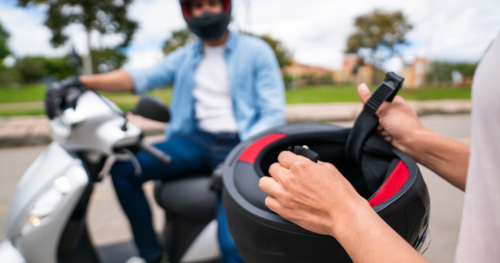
Riding a motorcycle in Florida offers a sense of adventure, allowing riders and their passengers to enjoy the open road and our state’s scenic beauty. Riding with a passenger can double the pleasure of a trip, but it brings additional responsibilities.
In 2021, there were 299 fatalities involving motorcycle passengers nationwide, of which close to half (46%) weren’t wearing a helmet. These numbers offer a sobering reminder of the need for safety and awareness for both passengers and riders when hopping on a two-wheeled vehicle.
Explore the legal requirements for carrying a passenger on your motorcycle in Florida and practical tips to ensure a safe and enjoyable journey for you and your loved one.
Why Riding with a Passenger Can Be Dangerous
Riding with a passenger on your motorcycle can be a great experience, but it also adds a layer of complexity to your ride you need to be aware of and prepare for. The extra weight changes how your bike handles, affecting braking, steering, and acceleration. This means you’ll need sharper focus and refined skills to navigate safely.
If your passenger isn’t used to motorcycle rides, their movements could upset the bike’s balance. For instance, if they lean the wrong way in a turn or shift suddenly in their seat at high speeds, it can make controlling the motorcycle more difficult.
Florida’s unpredictable weather and varied road conditions can exacerbate these difficulties, leading to slippery surfaces and a higher likelihood of collisions.
Motorcycle Passenger Laws in Florida
Florida has laws and regulations governing the transportation of passengers on motorcycles. Riders must follow these laws to ensure passenger safety and compliance with the state’s regulations.
- Minimum Age: In Florida, motorcyclists can carry passengers of any age with certain restrictions for minors. For instance, neglecting a child’s safety by speeding or not using a helmet may lead to legal consequences.
- Footrests and Seats: Florida law mandates that motorcycle riders can only carry passengers if their motorcycles have footrests and seats specifically designed for passengers. These features ensure proper passenger placement in the seat behind the driver or a separate seat attached to the bike (sidecar).
- Protective Gear: Florida law requires helmets for all riders under 21. Riders over 21 may choose not to wear protective headgear if they have an insurance policy that covers at least $10,000 in medical benefits for injuries resulting from a motorcycle accident. However, it’s important to keep in mind that serious head injuries can easily result in medical costs far exceeding $10,000.
- Insurance Requirements: Florida does not require motorcycle insurance by law simply to own a motorcycle. However, if you or a passenger is hurt in a crash, a lack of insurance could mean you are responsible out-of-pocket for your injuries or damages to other parties if you caused the collision. Furthermore, if you are at fault for a crash and didn’t have insurance, you may then be required to purchase insurance for the next three years or risk losing your license.
How to Drive Safely with a Passenger
Carrying a passenger on your motorcycle requires a higher level of caution and responsibility compared to riding alone. If you plan on driving with a passenger, follow these tips to protect their safety:
- Ensure Proper Gear: Before setting off, ensure that both you and your passenger are wearing appropriate protective gear, including helmets, eye protection, and any other recommended safety equipment.
- Communication: Establish clear communication with your passenger before starting the ride, since it may be hard or impossible to hear each other when the motorcycle is in motion over the wind and engine. Instruct them on how to hold onto you securely and how to lean with the bike during turns. Ensure a mutual understanding of how to ride together safely.
- Adjust Suspension: Riding with a passenger changes the weight distribution on your motorcycle. Adjust your suspension to accommodate the extra weight, which helps maintain stability and control while on the road.
- Smooth Riding: Practice smooth and gradual maneuvers with a passenger being heading out onto a road with other vehicles. Abrupt braking, acceleration, or turning can be unsettling for your passenger and may lead to instability. Gradual movement ensures a comfortable and safe ride.
- Braking Distances: Braking distances increase with a passenger onboard. Give yourself more space and time to react to potential hazards on the road.
- Respect Passenger Comfort: Be mindful of your passenger’s comfort and well-being throughout the ride. Frequent check-ins and short breaks can make a huge difference in ensuring a pleasant experience.
Call Aigen Injury Law If You’re Injured in a Crash
Riding with a passenger on your motorcycle in Florida can be exhilarating. But despite taking proper precautions, accidents can still happen due to the negligence of other drivers.
At Aigen Injury Law, our Miami motorcycle accident lawyers are committed to promoting motorcycle safety and helping crash victims get the compensation they deserve.
If you or a loved one suffered injuries in a motorcycle accident that wasn’t your fault, we can provide legal assistance and support. Contact us today for a free consultation.